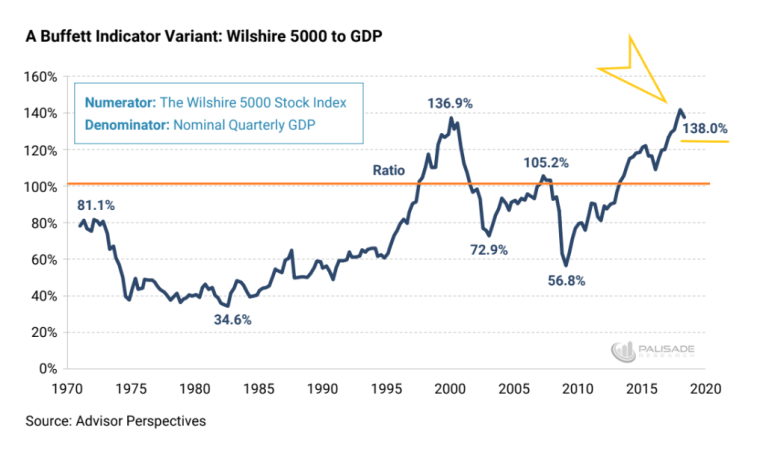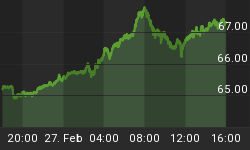Bitcoin was created in the wake of the 2008 financial crisis that wreaked havoc on the world economy, but it hasn’t quite had the chance to prove itself since. The fact is, stock markets have been doing well. Really well. Especially in the U.S. But now, some analysts are beginning to sound the alarms.
U.S. Stock Markets Are Becoming Risky
Following the bloodbath in February, the market has seen a sustained rally, held together by FAANG gains and lifted even higher with surprising second quarter earnings reports. Despite this, some of the most trusted indicators are suggesting that the fun may be over. And ‘smart money’ is already pulling out.
One indicator is in especially worrying territory. The so-called “Buffet indicator” measures the total stock market cap relative to the country’s GDP. Typically, this is a favorite among traders, but euphoria may be clouding their judgement in recent months.
Typically, when markets sit at 70-80 percent of total GDP, traders can see some handsome gains by throwing cash into the pit. But if that number inches above 100 percent many traders begin to see further investment as too risky. Where is number now? 140 percent in the U.S.

(Click to enlarge)
In looking at the chart, there is a pretty clear correlation between this indicator and market crashes, and the link is becoming becoming even more pronounced over time. Related: Steve Bannon Looks To Take On Europe
But more troubling than the risk being seen in U.S. markets, however, is what analysts are saying about the world’s second largest economy.
China’s Debt Bubble and Stock Market Stumble
It appears China’s bull run is officially over. The Shanghai Composite is already down more than 25 percent from January, and many are suggesting that the sell-off has just begun. To make matters worse, the tit-for-tat tariff war between the U.S. and China is sure to really begin taking its toll in the second half of the year.
China isn’t quite in panic mode just yet. The government has put in place a lot of safeguards since the 2015 crash, including a stricter control on capital exiting the country. The Central Bank of China is also investing a lot in onshore markets, hoping to prop up the yuan and maintain consumer confidence. But while China may be able to save its markets temporarily, it’s piling up even more debt in the process.
In recent years, China’s debt has soared to tremendous heights, and economists are beginning to worry about how a potential collapse may impact the world as a whole. From its ‘One Belt, One Road’ initiative to its vast appeal to international investors, there is a lot at stake if the nation’s economy were to take a turn for the worst.
Will Bitcoin Get a Chance to Shine?
Historically, August, September and October are tough months for stock market investors, often setting the stage for dips, crashes and crises in the months following. This hasn’t necessarily been the case for bitcoin, which, especially in 2017, has seen quite the opposite.
Analysts have tried time and time again to piece together some correlation between bitcoin markets and stock markets, but nothing really seems to stick. The truth is, bitcoin is still too young and too small. And with new variables coming into play every day, from regulation to institutional adoption, it’s impossible to predict what might happen next.
At its core, bitcoin was designed to be resistant to the troubles facing other markets. It’s peer-to-peer. It’s deflationary. It was built by a person or people who had lost faith in traditional markets.
Related: The U.S. Has A $4.5 Trillion Problem
In fact, the Genesis block even contained a stab at the current financial system: “The Times 03/Jan/2009 Chancellor on brink of second bailout for banks.”
So how’s it living up to its design?
Really, the answer to this question lies in the hands of the users. And unfortunately, as a side effect of its rise in price, it’s largely still a speculative investment for most rather than a government resistant currency.
The problem with this is that, despite Nakamoto’s dream, its speculative nature suggests that it could follow markets as they unravel.
Though many hail ‘institutional investors’ as bitcoin’s saving grace, they seem to forget that the cryptocurrency was created as a response to a problem that this segment created. And while the conversation about ETFs and institutional services seems to be the loudest right now, there’s very little to be heard in opposition to these movements. Do we really want bitcoin tied up in a broken system that will allow the institutions that caused a worldwide financial collapse to be bailed out by their governments?
The danger of institutional adoption vs. actual adoption is clear. While mainstream media will always be quick to highlight bitcoin’s risk, value or use cases, the real risk may just be in becoming a part of “their system.”
By Michael Kern via Crypto Insider
More Top Reads From Safehaven.com
















